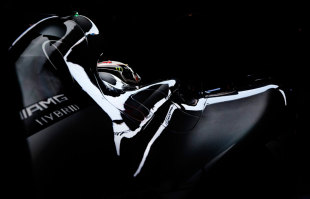

While Bernie Ecclestone might have his reasons for being unconcerned by F1's declining TV audience, Formula One - as ever - is currently going through one of its navel-gazing / soul-searching periods of grasping around for change that will cure all ills.
Recent discussions surrounding the introduction of 1000bhp engines, wider cars, and wider tyres are all aimed at making F1 better to watch by making the cars more obviously challenging to drive, while the Promotional Working Group was formed to help the sport both maintain its existing fanbase while making itself more appealing to the uninitiated.
Make no mistake - change is no bad thing, and seeking improvement is pretty much why we wear clothes instead of loincloths and live in houses rather than caves. But in aiming to get better we cannot forget what is already good.
The 2014 season may have been Mercedes-led, but it was also a year of very good racing. Making the cars tougher to drive - recreating opportunities for basic human errors to liven up the action on track - is a laudable aim, but there are other ways of livening up the action on track without spending any extra money or changing the rules.
One approach is to re-examine the worldwide feed. With up to 22 cars out on track at any one time, splicing together a coherent narrative of the race in real time is no easy feat. But there are occasions when the live timing screens show a promising battle in the lower points-paying positions that never sees light of day. Headlines may be made at the head of the pack, but more screening of the fights in the mid-field adds to both narrative and show for no extra cost.
Another inexpensive approach in cost-benefit analysis terms is for F1 to better promote itself. While FOM are making tentative steps into the world of social media, the lack of a general marketing department that pushes the sport as a whole has been an impediment. The specialist motorsport press may have ranted and raved about the impressive leap forward made in fuel consumption vs power delivery in 2014, but does anyone else know or care?
If we do go ahead with 1000bhp in 2016 or 2017, and are able to maintain our downwards slope of fuel consumption while boosting the power, the sport must advertise its achievements to the world at large. Green is never a label that the wider world will apply to Formula One, but if we can trumpet our successes in delivering max power at max efficiency, the man on the street will find us to be more environmentally credible.
Adding visual drama to the racing is a good idea in theory, but much like the tree falling in the forest, it's unlikely any new potential fans will hear our message of change unless the sport as a whole works to get out there and start spreading it.
Playing to the choir is an excellent way to maintain a loyal fanbase, but given that people have the unfortunate habit of ageing it is essential to focus on driving growth without alienating existing customers.
A media strategy that includes taking F1's current strengths and future plans into the mainstream components of the sport's untapped markets would not go amiss: drivers should be showing off their homes in tax-free havens on the likes of Cribs, while teams like Williams and McLaren with sizeable archives of historic cars should seek out exhibitions in art and design museums around the world. (New York's MoMA has a Ferrari 641 on display in its design department.)
Formula One already has a lot of good ideas. But for a sport once so synonymous with noise, we're pretty bad at shouting about them.
